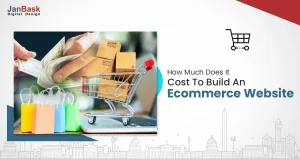
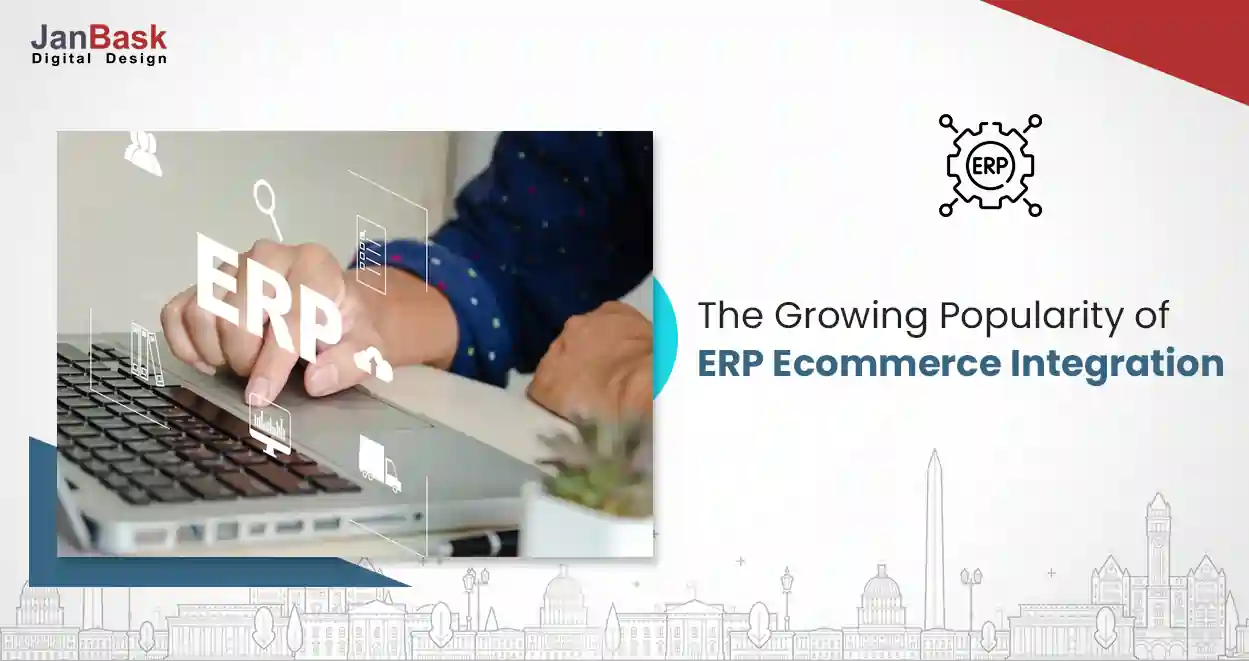
It's important to think about obstacles that might arise when creating a strategy for eCommerce B2B. It's common for there to be a few detours along the way. There are, however, a few obstacles so large that they effectively halt the journey. An incorrect ERP ecommerce integration can be disastrous for an eCommerce rollout. Therefore, it is crucial to plan ahead to integrate ecommerce with ERP and pick an appropriate eCommerce platform to reduce the likelihood of integration issues.
An effective ecommerce integration with ERP will help your business improve customer experience, streamline sales processes, and increase data visibility.
But let us first understand what is ERP and how does it work.

Looking to Create a Custom B2B Website?
Enterprise resource planning (ERP) first gained notoriety in the 1990s when it began collecting and storing information from all departments in one place. The modern ERP system provides assistance with a wide variety of routine operational and administrative tasks across a variety of sectors and divisions.
An enterprise resource planning (ERP) system is a type of business software that helps organizations streamline their operations by coordinating and unifying their disparate data systems.
Enterprise Resource Planning (ERP) software allows businesses to manage their operations from a central hub. Implementing an effective enterprise resource planning system is essential for most business-to-business enterprises. ERP software allows for the smooth completion of many administrative tasks, including IT services, inventory software, warehouse management, and HR tasks.
Some businesses use enterprise resource planning (ERP) software to keep track of their finances. Often, they will compile information like sales, salaries, and expenses. Some examples of the data gathered are reports, projections, and budgets.
Some businesses require ERP software to connect with logistics providers. This is especially helpful for e-commerce companies that use warehouse management solutions and want real-time updates on stock levels. Integrating your enterprise resource planning (ERP) and electronic commerce platforms means incorporating as much relevant business data as possible into your ERP.
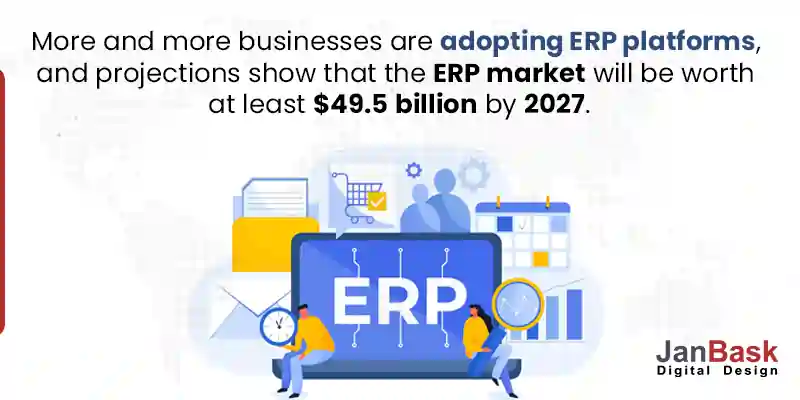
Put simply,ERP integration is the process of establishing a connection between an ERP system and external data sources and maintaining that connection and synchronization. The integration of ERP software allows for the consolidation and real-time monitoring of data from multiple sources, including the ERP itself.
ERP is undeniably a powerful resource for companies. Because it is such a valuable sales tool, your ERP system must be compatible with your eCommerce platform. That's why ERP integration is so important for businesses: it allows them to consolidate their data into a single repository, which boosts efficiency and insight.
ERP ecommerce integration has many potential advantages, including improving customer service and optimizing internal operations.
ERP integrated ecommerce cuts down on redundant data entry, which is another benefit of this B2B ecommerce ERP integration. It's more than just a time saver to have information like customers' names and addresses automatically entered. Errors caused by typos, such as misspelled names, wrong addresses, and incorrect email addresses, are less likely to occur.
Of course, wrong addresses lead to lost packages, which in turn leads to unhappy customers and higher costs for your business as you work to track down and replace the missing items.
When an ERP serves as the hub of a company's data management infrastructure, ERP and ecommerce integration ensures that all employees have access to accurate and up-to-date information. This becomes crucial when your company has multiple locations or employees from different locations need access to the same data.
The alternative to ERPs that can provide consistent information to all employees is for team members to constantly log into dozens of disparate systems to get the information they need. Data from enterprise resource planning systems and electronic commerce platforms reduces wasted time and boosts productivity across the board.

As a result, communication within teams and between organizations and partners improves. Marketing managers can easily assess the efficacy of past campaigns and consult with content developers about future posts for the website and social media accounts.
Before a shortage, spike in returns, or other logistics issue gets out of hand, managers can consult with warehousing experts about what to do. In order to grow your ecommerce business in real time, you need your teams to be able to work together more effectively so that problems can be solved more quickly.
Ecommerce and ERP integration provides a tremendous opportunity to address customer concerns. One of the most crucial aspects of any business is figuring out what customers don't want. You can do that by compiling information from your ecommerce apps, SaaS, and different communication systems.
For example, unneeded or inconvenient parts of the customer journey can be eliminated. It's possible that customers share your opinion that it takes too long from initial contact to final purchase. Do you rely too heavily on email templates and need more personal interaction? Is it too late or too early to call your leads? By centralizing your data, you can eliminate these friction points and improve the customer experience, increasing revenue.
Data from your enterprise resource planning (ERP) system and your online store can help you monitor changes in your customers' willingness to pay, your own profitability, and the frequency with which people abandon their shopping carts.
Real-time analysis is another benefit of data integration for businesses, especially when automation is used to generate a steady flow of useful business data. How crucial is it to have your business data analyzed exactly when you need it? The quicker you can get at your data and analyze it, the sooner you'll have the profound insights that will direct your business's course.
There is less room for human error and more opportunity for data consolation with automated accounting processes. Your company can reduce the likelihood of making mistakes on its tax returns by using an enterprise resource planning (ERP) solution that provides assistance with accounting.
We help your company to integrate all of the business processes, from sales, manufacturing, and finance to HR, customer service, and administration - into a single seamless system. Joining forces with CRM is a powerful way to organize and centralize the flow of data in your organization. The process of integrating an ERP with a CRM system needs a lot of expertise, but with our ERP integration service, it's not only easy, but it's also affordable.
53% of IT decision-makers said that ERP and CRM are investment priorities.
Naturally, ERP system integration is not easy. A properly planned and executed project will employ a solid integration solution and perform as expected.
However, the integration process could be disastrous without taking into account the interplay of various systems and architectures. Common software systems include Microsoft, Oracle, NetSuite, Salesforce, and SAP, but they don't always play nicely with one another.
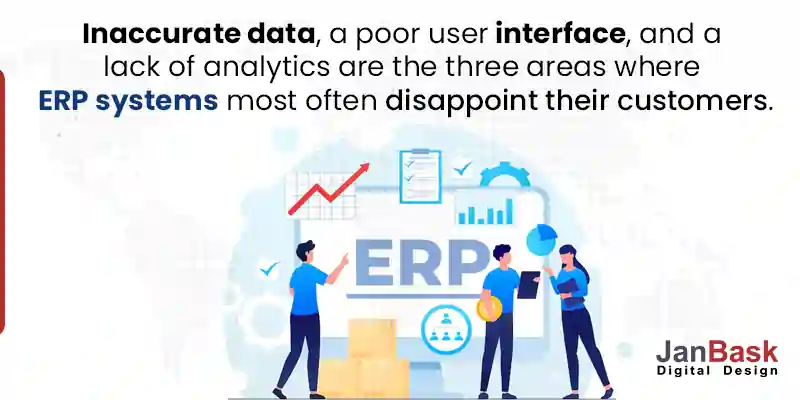
Bringing together disparate systems for the sake of software integrations can have unintended consequences and drive up prices. When integration is first turned on, even the most meticulous planners don't know how it will perform.
It is impossible to overstate the difficulty of integrating new and legacy systems, both of which have their own distinct architectures. Different programs have different needs, and those needs aren't always compatible with one another. Integration with an ERP system always presents a formidable technical obstacle.
About a third of businesses talk about ERP implementation before deciding on a product, while another 56 % do so during the selection process, and the remaining 13 % do so just before going live.
Your e-commerce company can streamline the use of multiple applications and programs by adopting an ERP solution. There is a wide variety of ecommerce ERP software to choose from, but the most popular and effective ones that many B2B companies use are:
Leads can be tracked, field services can be automated, and overall business operations can be enhanced all from the convenience of a mobile or web-based interface thanks to this enterprise resource planning software.
This enterprise resource planning (ERP) system caters specifically to machine and job shops by integrating estimating and accounting processes, managing resources, and customers, and providing insights through data analytics.
It is a family of ERP software for ecommerce that integrates CRM and ERP functionalities with productivity software and AI-powered analytics to serve businesses better.
When it comes to Enterprise Resource Planning (ERP) software, manufacturers are the most common users.
SAP, a cloud-based enterprise resource planning (ERP) system that is modular and is powered by artificial intelligence (AI) and analytics, enables businesses to perform critical functions in real-time from any location using intelligent process automation and individualized insights.
Workday is a cloud-based enterprise resource planning (ERP) system that streamlines the HR, finance, new hire onboarding, and accounting processes of multinational corporations.
By 2022, worldwide investment in cloud applications is expected to total $226.9 billion, with cloud platform services bringing in another $70 billion.
Odoo is an example of enterprise resource planning system that helps large businesses streamline HR processes, customer communications, and financial reporting.
Integration of this ERP system into e-commerce operations benefits small and medium-sized businesses across many sectors. It helps track stock, performs analytics, handles shipments, and generates reports.
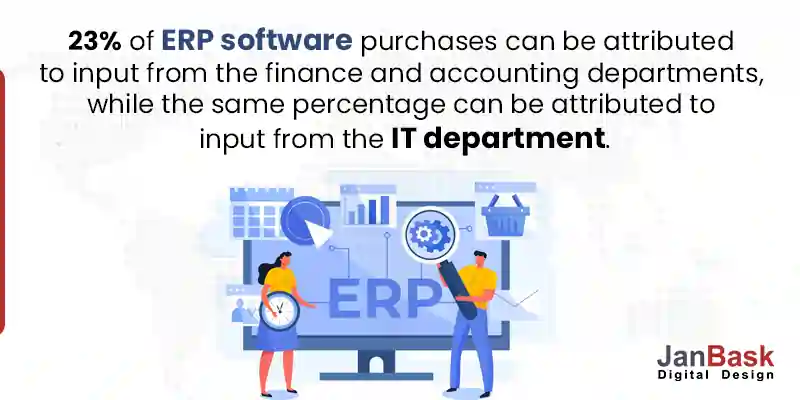
The software is flexible enough to meet the requirements of any industry. Financial planning and management, order management, and production management are just a few of its many useful functions.
All facets of your business, from management to development to delivery to measurement, can be handled centrally, and you can choose between on-premise and cloud hosting.
Because of the potential for business interruption, many companies are hesitant to implement such software into their daily processes and procedures. However, most enterprise resource planning programs are compatible with an organization's already in-use programs, making the switch over quick and painless with minimal impact on business operations.
Whatever your online business's focus is, eliminating data silos and gaining access to all the data that can lead to extremely helpful insights is the primary goal of integrating ERP and ecommerce. With the help of an efficient ERP integration solution and ERP integration services, you can streamline the flow of business data into your data warehousing solution, from which you can draw useful insights to incorporate into your CRM system or business intelligence tools.
Your online enterprise has the potential to grow if you're prepared to adopt ERP integration solutions for your current e-commerce procedures or are thinking about making the switch to a new platform. An integrated ERP solution will allow you to increase your online sales without increasing the workload of your employees by automating inventory updates, order tracking, and accounting.
Future-proof expansion requires solutions that can adapt to changing market conditions, and ERP systems that can be integrated with online shopping provide just that. By working on perfecting your online store, you can instill trust in your customers and draw in new ones who will become regulars.
There are a lot of enterprise resource planning companies out there. What sets us apart from the rest is our end-to-end, integrated approach to customer success. Need to integrate your ecommerce system with the ERP of your choice? We provide professional ecommerce ERP integration services for the top ERPs. Contact us today for a free quote!
Looking to Integrate ERP for your Business?

Q1 What is an ERP?
Enterprise resource planning systems serve as bridges. It is a software that facilitates data sharing between previously separate systems and procedures. It's a centralized hub for various business apps like purchasing, inventory management, HR, and financials.
Q2 How much does ERP integration cost?
To put it briefly, "it depends." The costs of a project are increased by the difficulties it encounters. The initial cost for an enterprise-wide integration project is expected to be in the millions. Estimates for small and medium-sized businesses put the price tag in the middle of the six-digit range.
Costs are impacted by various factors, including system(s) to be integrated, ERP vendor, SaaS platforms, on-premises ERP versus cloud ERP, and the number of users.
Q3 Is it necessary to integrate with an ERP system?
The use of ERP software helps companies eliminate silos and function as one unified entity. You can keep up with the rapid pace of business by sharing data and taking advantage of the new insights and efficiencies it provides. When you have access to data in real-time, you can optimize the customer experience and respond quickly to market shifts, both of which positively affect profits.
Q4 Can you provide some examples of ERP software?
The most popular options among B2B companies today are enterprise resource planning (ERP) systems like Microsoft Dynamics and SAP, which combine your most important business functions for improved data organization and seamless process automation.
Q5 Can ERP-integrated e-commerce be fully headless?
Absolutely! If you're running an online store, using a cloud-based solution means you can keep all of your data in a single, easily accessible location, where it will sync in real-time. This is perfect for B2B organizations concerned with adaptability and flexibility in the future.
P
So far, I know you’re blessed with a creative mind and this profession best suits your team. I genuinely appreciate your team’s help in coming up with such a good topic of Integration ERP in E-commerce and presenting them in such a great sequence.
L
Let me start by saying I am a big fan of your work and I have been following it for a while. With that said, I have a few notes about the last article you put out. I was thoroughly impressed by your team’s superior writing skills.
J
Your writing changed my perspective on this topic about Integration ERP in Ecommerce. I enjoyed reading your content. Keep doing your best work. Everything in your article is just perfect. In my opinion, this one is one of the best articles you have written so far.
C
Just a fan of your ideas. I must say that the essay you wrote on Integration ERP in E-commerce was truly remarkable. Otherwise, I didn’t know the truth behind it all. Every article your team wrote is just a unique experience. No words, just applause.
R
Hats off for this content.I’ll admit that this article made my day. It doesn’t happen a lot, but when it does, I know the writer did a damn good job. Such a helpful topic of Integration ERP in E-commerce articles is this. I enjoyed reading your content.